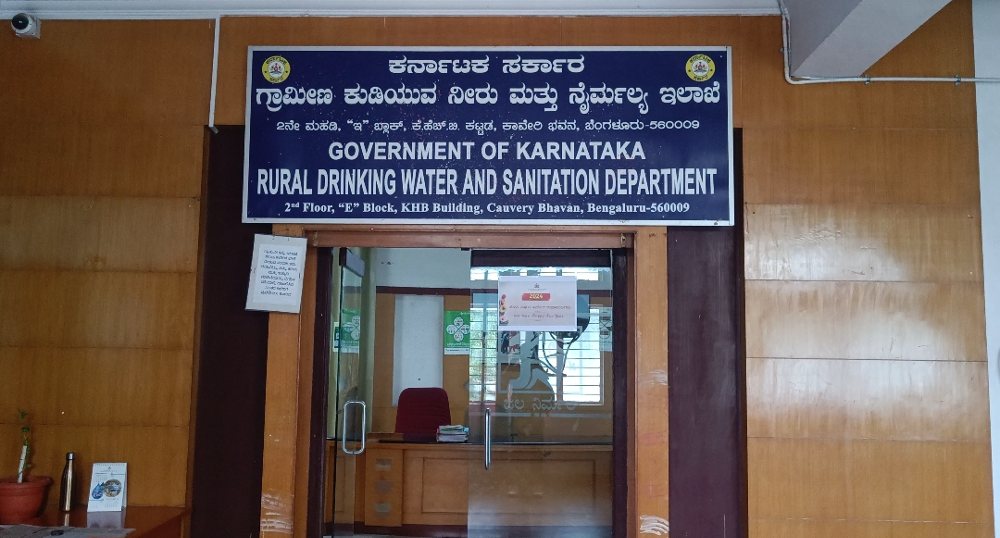Drinking water security remains a concern in Karnataka. Officials say it is the shared responsibility of villagers and authority.
Safe drinking water is still not accessible in rural Karnataka, with reports of deaths and diseases due to contaminated drinking water surfacing, despite efforts to implement Jal Jeevan Mission (JJM).
Prashanthi, a resident of Rabbankal village, complained that the water from the drains is getting mixed up with the canal water, making it unfit for drinking. She said that her family members have been diagnosed with dengue and typhoid cases.
Ajaz Hussain, Chief Engineer, Rural Drinking Water and Sanitation Department (RDWSD), said that currently 80 testing laboratories are in place and they are continuously testing samples. “There is a water quality monitoring system (WQMS). Also field tests are important. If there are reports of contamination, we’ll do field test,” he said.

Field test is a set-up of simple portable equipments to measure various chemical constituents and contamination from the water sample. Commonly, the samples are analyzed in the laboratories.
Hussain said that people should follow more hygienic practices. Open defecation, for instance, he said, needs to be fully eradicated. “It is a point of worry for us,” he said.
However, in some cases, lack of proper infrastructure leads to such practices. The children in Vaddarahatti village anganwadi are forced to urinate publicly because they don’t have toilets.
Shanta Nayak, caretaker in the anganwadi said that water is a major issue in the village. She usually goes to her home to use the toilet, and brings drinking water from her home for the children. “There are leakages in pipes, and the panchayat filter often doesn’t have water,” she said.
The broad objectives of JJM include providing functional tap connections to schools, anganwadi centers and community buildings.
Gowthamghosh B, assistant professor, Institute of Health Management Research (IIHMR) Bangalore said that proper infrastructure should be provided by government, both state and central, and it should be sustained, “India has declared that we are open defecation free. Concerned department and village level committees should look into it to stop open defecation.” He added that it also depends on people’s perception and attitude.
Eshappa, panchayat office secretary of Vaddarahatti grama panchayat pointed out the drainage issues as well and said that the panchayat usually cleans them every three months. “People are not willing to clean the drains and public toilets now-a-days,” he said. He added that people from UP and Bihar used to come to clean, but they are not coming anymore.
Jal Jeevan Mission Karnataka (JJM), a centrally sponsored scheme, was implemented on 2019 with the objective of providing safe drinking water to rural households by the year 2024. The objectives of the mission are to monitor functionality of tap connections and to assist in ensuring sustainability of water supply system, along with awareness.
According to JJM data, out of over 19 crore households, 14 crore Functional Household Tap Connection (FHTC) are provided in every rural home. In Karnataka, about 74 lakh out of 1 crore households are provided with tap water supply, so far.
Ajaz Hussain said that Jal Jeevan Mission is implemented in total 26 villages right now. “Hundred per cent work is done for 2500 connections. Others are in progress,” said Hussain.
However, recently, deaths and sickness have been reported in different parts of North Karnataka related to contaminated drinking water. Kalyana Karnataka region witnessed death of 16 people in two years. Gowthamghosh said that regular supervision and community awareness is necessary to tackle the issue of water contamination, “Pollutants in safe drinking water and pipes make it non-consumable. This might lead to diseases like cholera.”
He said that the water should be tested and treated before releasing it to the public to consume. “Somewhere, the testing part is missing. It should be taken care of,” he said.
He also suggested that students should be taught about hygienic practices at school level.




